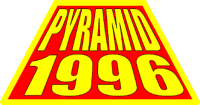| Host | |
| Mark L. Walberg | |
| Taped | |
| November 19, 1996 | |
| Packager | |
| Columbia/Tri-Star Television | |
This is chronicling the 1996 Pyramid pilot.
Game Format[]
Main Game[]
The game is played with two players in a game of word communication, along with six "celebrities", referred to as the "Pyramid Players".
- Ted Henning: He played Guard #2 on an episode of Babylon 5.
- J. Karen Thomas: She played Jamie's mom in Leprechaun: Back 2 Tha Hood along with about 30 other roles.
- Kevin Anthony Cole: Played Simmons in the direct-to-video Asylum.
- Heather Marie (Mardsen): Was a semi-regular on The Army Show.
- Dar Rollins: Only credit is One Sung Hero. Now an agent, he's married to Sabrina, The Teenage Witch semi-regular Lindsay Sloane.
- Sherl Kay: Never appeared in anything. Not even in Google. Must have been a seat filler when somebody didn't show up. Apparently is now a motivational speaker.
Round 1[]
Each "Pyramid Player" is assigned one of six categories, which were puns hinting to the content within that subject. The player chose a "Pyramid Player", in turn a category, and then a subject under that category was given. Each subject has seven words/phrases/names. The team had 30 seconds to guess the seven answers that fit into the category. One player described each item while the other player tried to guess what the words are. Each correct word was worth one point. Getting all seven answers won the player a prize. When a word was passed, it can be returned to, time permitting. If at any time the clue giver gave away any part of the answer or conveyed the essence of the answer, a cuckoo sounded and the word was thrown out.
Round 2[]
Each player had sixty seconds to give a list of items that fit a subject while each "Pyramid Player" tried to guess what they all have in common. Once all six "Pyramid Players" guessed, the player started over. If at any time the giver gave an illegal clue (giving away part of the answer, conveying the essence of the answer, descriptions of the category or a synonym) a buzzer would sound, and the player moved on. Each correct answer was worth 5 points and $100.
Round 3[]
Same as round 1, but only three subjects. Each contestant selected one subject and "Pyramid Player", and they alternated giver-receiver roles trying to do as many words as possible in 60 seconds. Ten points per word in this round.
The player with the most points won the game.
Final Pyramid[]
The "Pyramid Player" and the winning contestant faced a larger pyramid board of six subjects with the player having his/her back to the board. The winning team had 60 seconds to climb up to the top of the pyramid by getting all six. On each subject, the "Pyramid Player" gave a list of items that fit the subject while the player. tried to guess what they all have in common. As soon as the guesser gets the right subject or passed, they moved on to the next subject to the right. Upon a pass, the team can come back to it if there's time leftover. If at any time the giver gave an illegal clue (giving away part of the answer, conveying the essence of the answer, descriptions of the category or a synonym) a buzzer would sound, the subject was re-concealed and the team forfeited the chance at the big money. Each correct answer was worth $200, and getting all six won $25,000.
